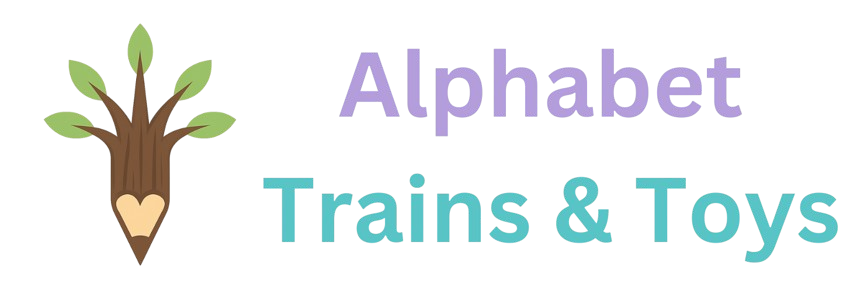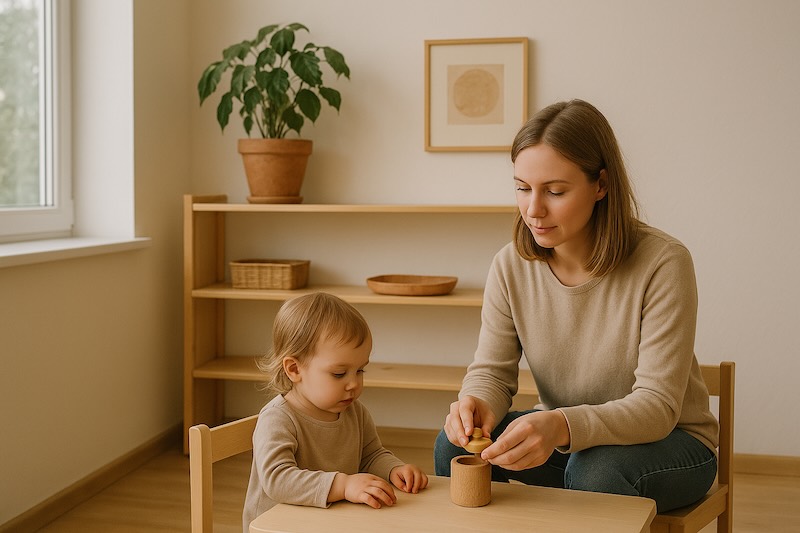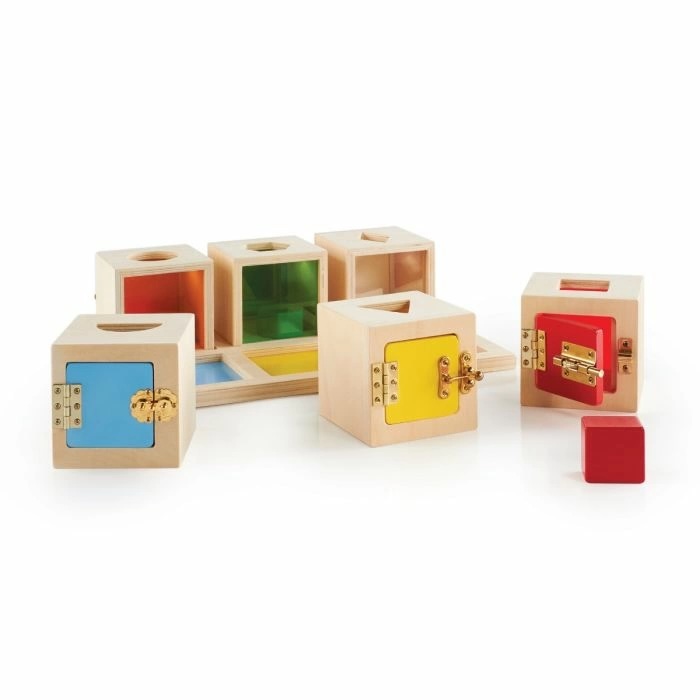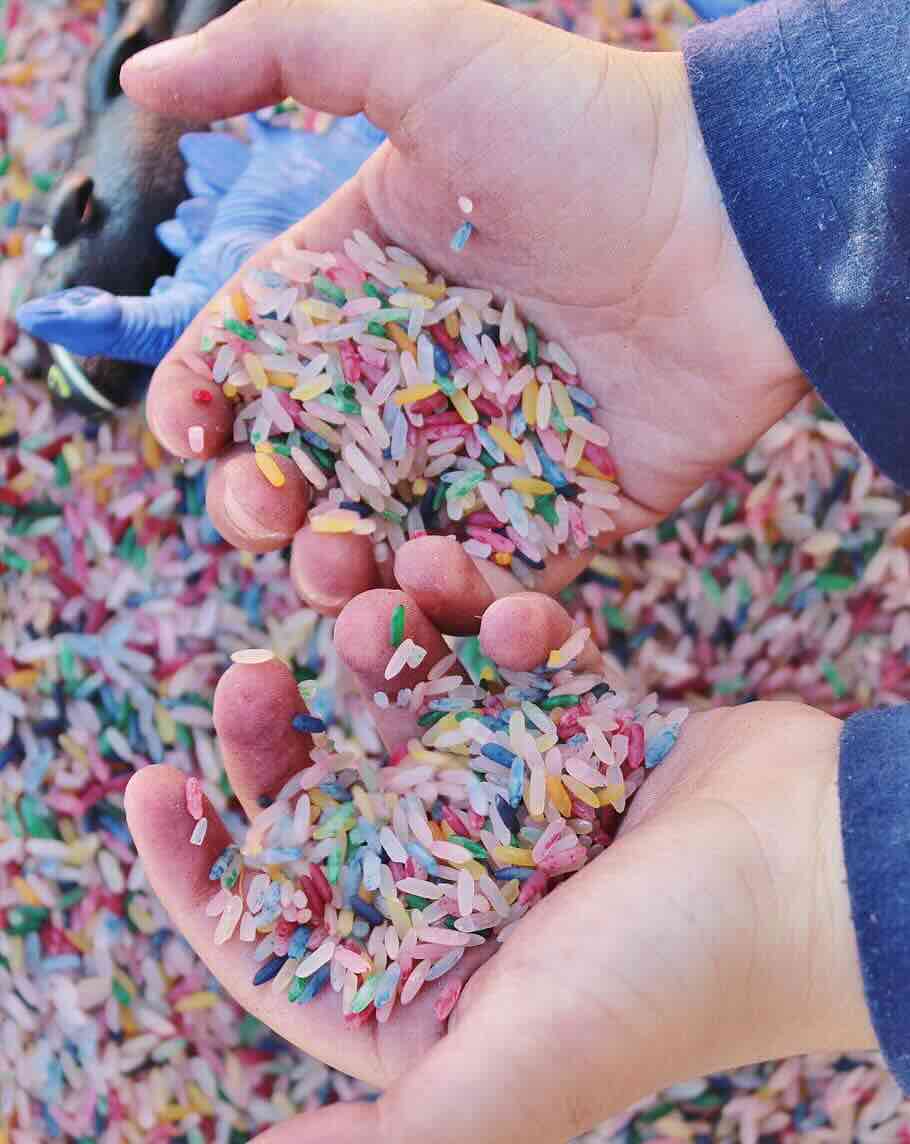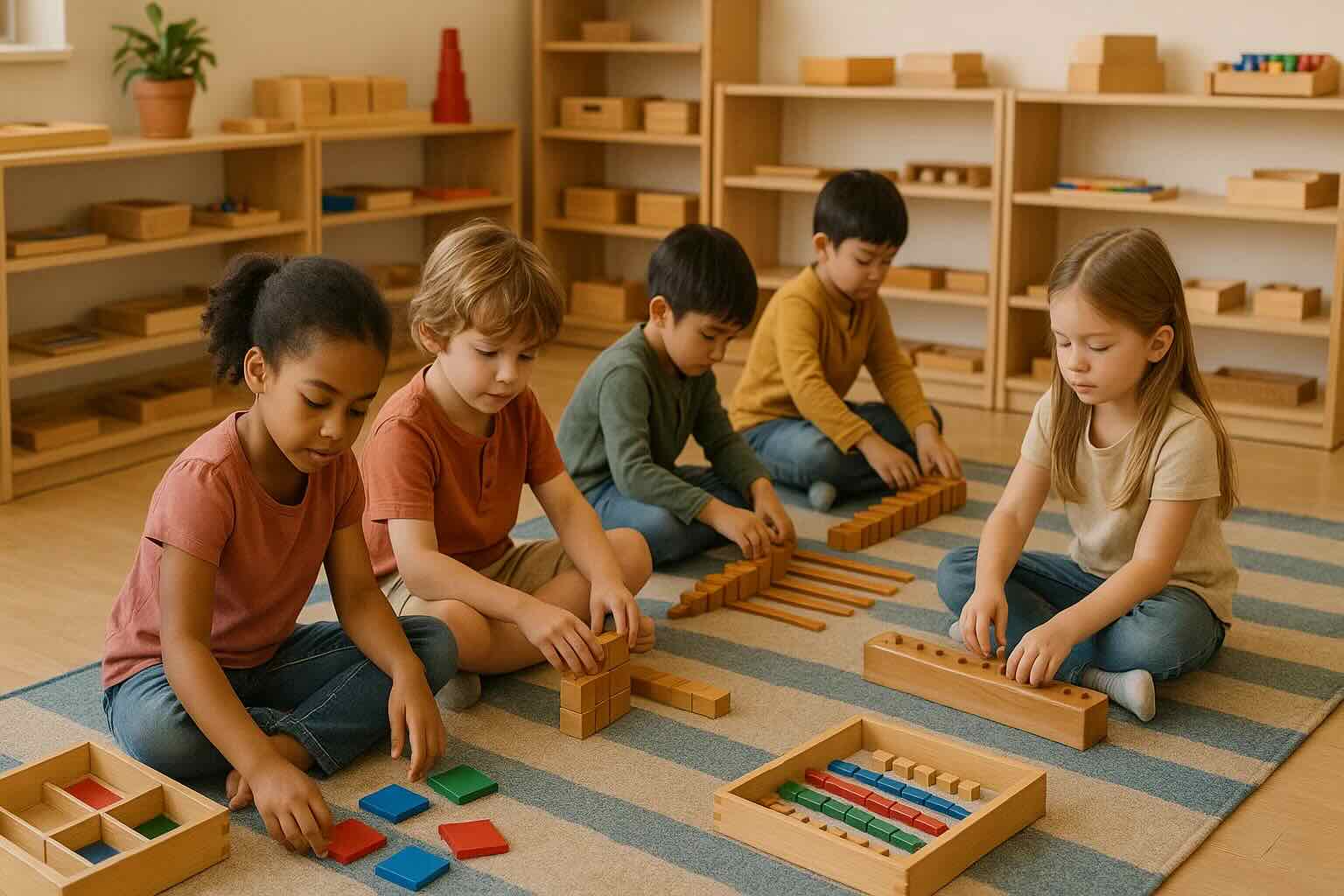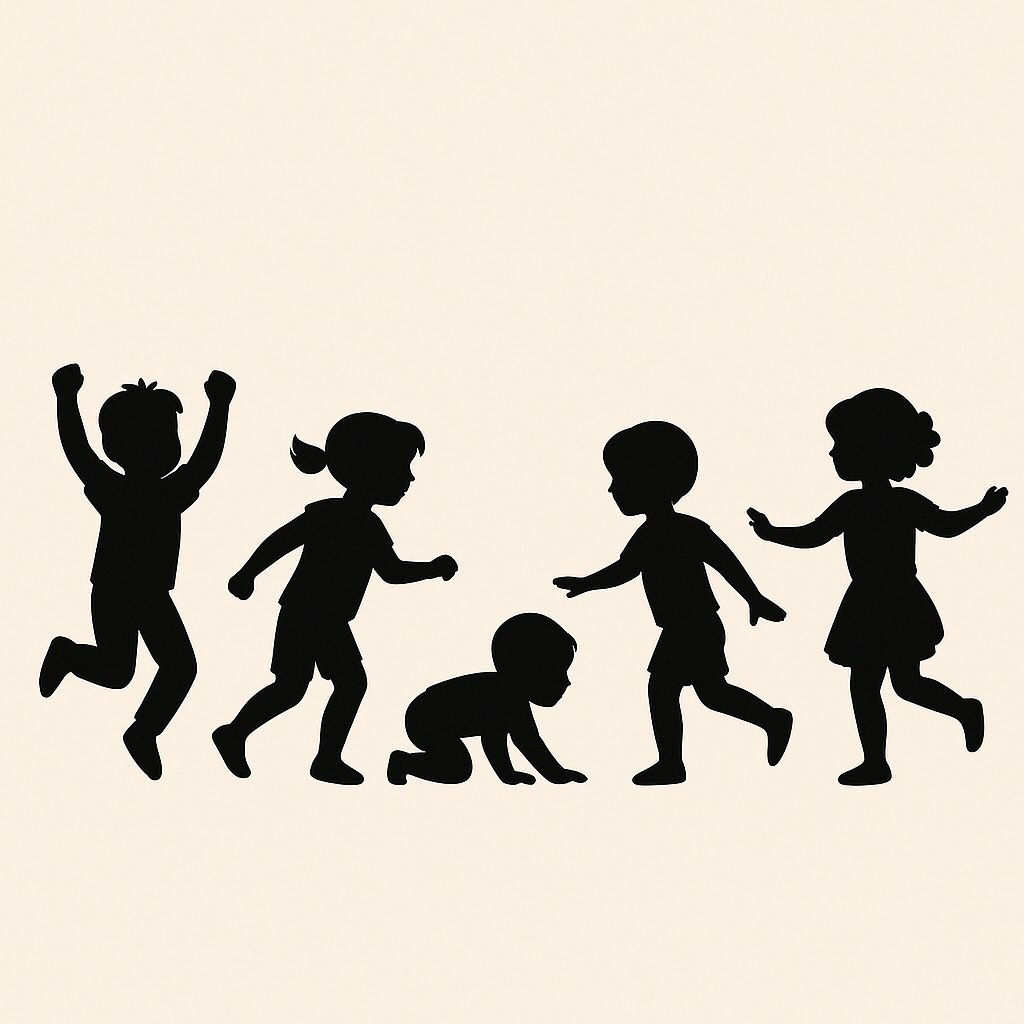I entered the school system in first grade. I did not attend daycare, PreK, or traditional kindergarten. My mother's idea was teaching was for teachers which meant I entered first grade without any knowledge of numbers, alphabet, colors, or other basic skills. I was not able to tie my own shoelaces. For that reason, I have struggled my entire life to catch up to the standards many people take for granted.
For me to imagine confidently choosing my own learning journey was not an area my parents explored. To expand my world based on my curiosity would have been a dream come true. Fortunately, modern children's skills to do well in school and handle their feelings are explored and encouraged. Montessori parenting is a special way of teaching that helps kids reach their highest potential. The method is based on Maria Montessori's ideas of changing the way we help our kids grow by honoring their natural development and building independence.
Life is busy. The Montessori program is a key to finding a parenting style that fits well with each family's routines. It supports a child's growth in all areas - social, emotional, and thinking skills. Creating a space that feeds a child's natural desire to learn and be curious is a goal of this method. It is more than simple education. It's about helping children be their best during their most important years, setting them up for a successful life.
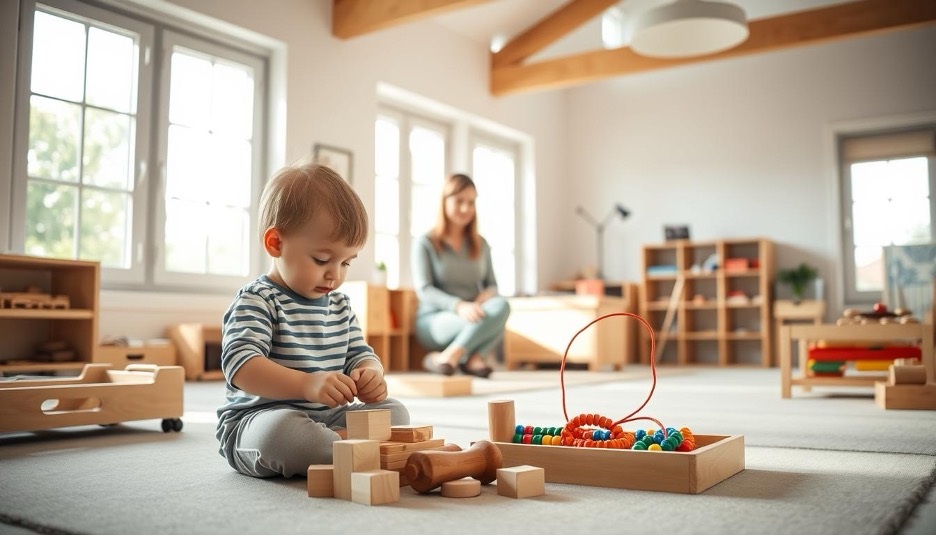
Figure 1. Montessori toys help children at any age have fun while learning.
🎁 Looking for Montessori Toys?
Our collection of Montessori toys is designed to support hands-on learning, independence, and fun! Perfect for every stage of your child’s development.
🛒 Shop Montessori ToysMontessori parenting is a concept that emphasizes child-led learning and developmental regard by helping parents or caregivers realize what the strong points are in their children's development. It fosters independence, curiosity, and a lifelong love for learning by helping children explore what is interesting to them. It helps children exhibit higher problem-solving skills and standardized test scores.
Understanding Montessori Parenting Style
Montessori parenting principles come from Dr. Maria Montessori's innovative ideas. She focused on nurturing a child's potential with hands-on learning, self-direction, and positive environments. These principles help children explore the world with eagerness and self-assurance. According to the American Montessori Society, over 5,000 Montessori schools in the U.S. and over 15,000 schools worldwide support this effective educational approach.
The Philosophy of Maria Montessori
Dr. Maria Montessori's philosophy was shaped in the early 20th century. She focused on a child's natural growth in all areas which is different from traditional adult-led teaching. "The greatest sign of success for a teacher... is to be able to say, 'The children are now working as if I did not exist.'" - Maria Montessori
Core elements of Montessori Education are based on studies that show respect for the child's potential and individuality rather than presenting a one size fits all curriculum. It fosters the idea of prepared environments are designed to meet the child's needs to encourage independence and discovery. These environments include having areas set up to keep items within the child's easy reach and giving them the confidence to understand the items in that area belong to them. By teaching a child the possessions are theirs, they can understand the need to take care of them. Autoeducation allows children to learn at their pace through activities that interests them without ignoring standard teaching concepts at each age.
Implementing Montessori Principles at Home:
- Creating a Prepared Environment ensures spaces will fit the child's size and skills, placing toys and items within their reach. It also encourages the child to keep a neat area to boost their learning potential.
- Fostering Independence by allowing the child to tidy up and care for their own possessions. This develops their responsibility and self-esteem. They learn to find the items in the correct space when they need them the next time for playing.
- Observing the Child to specifically see what interests the child and offer activities that match their curiosity. Rather than spending time constantly telling them about the things they cannot do, offering choices of activities they can do is a more positive approach.
- Using Real-Life Experiences builds confidence by including the child in everyday tasks such as picking out their clothing, dressing themselves and later building to activities such as simple cooking and gardening. These skills are vital for maintaining lifelong learning habits.
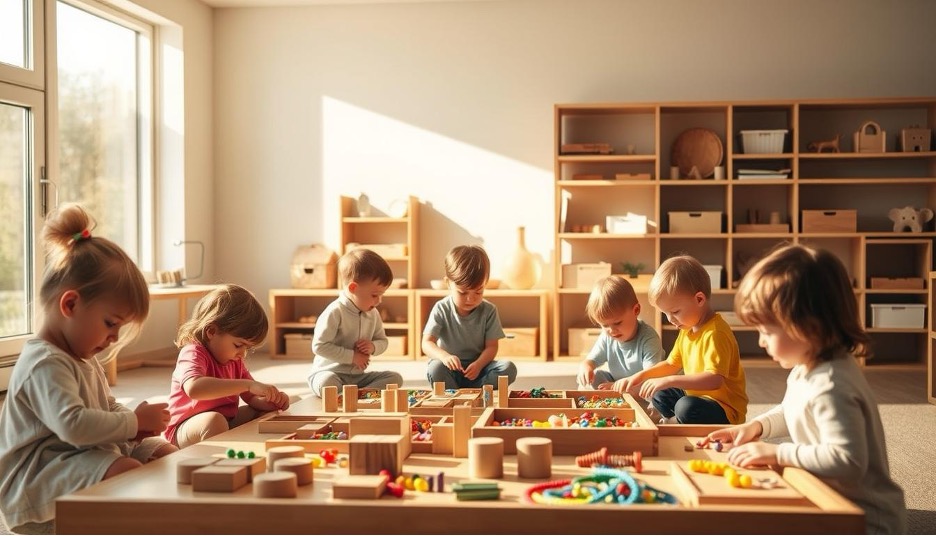
Figure 2. Using and sharing Montessori toys fosters sharing and teamwork. These are valuable skills they will need in the future.
Using Montessori philosophy in a child's life supports their growth in many ways including creating a stronger bond with them. The aim is to tailor Montessori education principles to each family, fostering a loving and enriching Montessori home environment that will extend personal growth within the entire household.
The benefits of Montessori Parenting are highlighted by nurturing independence and confidence by helping children learn to do things by themselves. They work on their own projects, learning how to finish tasks alone. This builds their confidence and self-reliance, making them trust in their abilities. However, this should not be complicated by simply allowing the child to only do what they want to do. They still must be guided and shown there are rules everyone in the home must live by and the consequences of not following those rules.
If you're struggling to implement these boundaries while still nurturing independence, our article on Montessori parenting support offers helpful strategies for staying confident and consistent.
Other benefits include fostering curiosity and love for learning by helping them love learning, encouraging them to keep seeking knowledge all their lives. This key Montessori benefit is it helps foster natural curiosity. They learn by exploring and discovering things. Encouraging story time so that parents and children can explore interests together and strengthen their parent child bond.
The Montessori Method's goals are to aid in building life skills through practical activities and helping them face real-world issues. Children learn responsibility, such as cleaning and tidying their play area, how to solve problems such as dressing themselves and tying their shoes, and taking care of themselves by washing their hands, brushing their teeth and having a set bathing routine. These life skills help them handle life confidently and skillfully—including milestones like potty training the Montessori way.
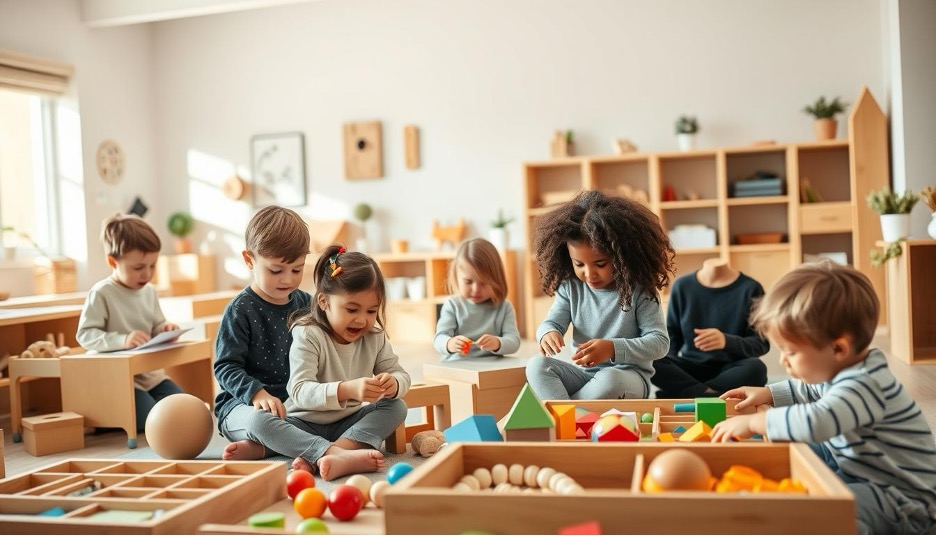
Figure 3. Working alone in a group setting or playing together as a group allows children to learn to cooperate with others.
How to Do Montessori Education at Home
Designing a Montessori space at home means creating a well-organized area that inspires a child to learn and grow on their own. For a step-by-step walkthrough of this process, read our Guide to Setting Up a Montessori Environment at Home. This process involves choosing educational toys and Montessori materials that suit their age and abilities. It is important that parents can achieve this by preparing a space, selecting the right tools, and establishing order to encourage a child's independence.
Setting Up a Prepared Environment by creating a safe place for children's exploration. Use low shelves for books and toys, so the child can choose what they want to play with. Add a small table and chairs where they can do activities like reading and arts and crafts. Include areas for practical life tasks, like taking care of plants, organizing toys, or helping with pet care. Children learn to be responsible and orderly by doing these household chores daily.
Choosing Montessori Educational Materials and Toys and materials that fit the child's learning stage. Choose items made from natural materials such as wood, cotton, and metal for sensory growth. Sensory toys that encourage imagination are better than passive ones. Rotate toys and books often to keep their interest and avoid boredom. Make sure these tools are within easy reach to encourage learning on their own and have shelves the child can reach to put them away after each use.
🧠 Is Montessori Parenting Right for You?
Take this short quiz to find out how aligned you are with Montessori principles!
Creating Order and Encouraging Independence is easier if the Montessori space helps a child to learn to be independent and organized. Child-sized furniture makes it easier for them to do daily tasks and take care of themselves. Real kitchen tools scaled down teaches them the importance of utensils and how to be responsible. Letting kids have access to cleaning tools and healthy snacks on their own promotes independence. Adding seasonal nature trays and spots for their belongings, like low hooks, boosts the Montessori vibe. It makes exploring and growing easier for them.
🏠 Montessori at Home: Quick Checklist
- ✅ Low, accessible shelves
- ✅ Natural, open-ended toys
- ✅ Child-sized furniture
- ✅ Calm, organized learning space
- ✅ Daily practical life tasks
Need help getting started? Explore educational toys to begin building your Montessori space today!
With these steps, a home's Montessori environment will support a child's growth in independence, order, and learning. This method boosts cognitive, emotional, and social skills, creating a path of lifelong learning. The child learns they belong in the home, and they are a part of what happens daily.
Montessori Method for Different Age Groups
Montessori works for all kids, no matter their age. It offers just-right activities for Montessori for toddlers, preschoolers, and elementary-aged children. This method ensures kids always get what's right for their age and skills as they grow.
Montessori Activities for Toddlers who love touching and moving things. At this age, it's all about doing things themselves and safely checking out the world, which is key in developing the Montessori toddler. Playing with play dough helps make their hands strong. Using tongs and puzzles improves their tiny motor skills. Practicing pouring and scooping helps to get better at coordination.
Adapting Montessori Techniques for Preschoolers who are full of wonder and love doing things on their own. These activities are great for their growth. Montessori grows with them by offering chances to: Get creative with role-playing and pretend play, to learn practical skills like dressing up and helping around the house, to begin reading and telling stories to light up their brains.
Montessori Strategies for Elementary-Aged Children helps them tackle bigger challenges and make friends through the Montessori way. Here's how: they find they can do more complex tasks and work on projects together; their classes have kids of different ages to help each other learn and cooperate with each other, they have a say in what they want to study, which helps them be independent.
Montessori's magic is in its ability to change with the child. It keeps feeding their love for learning with fun and correct activities for each age group, helping them hit those big milestones more easily while keeping the parents involved on every level.
Montessori parenting is getting more attention from parents, educators, and researchers. This approach boosts a child's development, emotional growth, social skills, and physical abilities. It's important to see how these methods will ultimately shape a child's future. In a time when people are rushed to complete their tasks, it is important that each child understands their importance in the home as well.
Supporting emotional and social growth by helping children deal with their feelings and how to understand getting along with others. Learn more about this in our guide to emotional regulation in Montessori. Children in these Montessori classrooms learn from other children of different ages rather than having strict classrooms of peers that are the same age. This teaches them empathy and how to work together, making them more socially skilled and emotionally mature. Teamwork is a crucial part of success in adulthood and this method helps children see teamwork as a normal part of their life.
Aspect of Child Development | Montessori Impact |
Cognitive Development | Improves critical thinking and problem-solving skills |
Emotional Growth | Fosters emotional regulation and empathy |
Social Skills | Encourages respectful communication and collaboration |
Physical Coordination | Refines fine motor skills through practical activities |
Common Challenges and Solutions in Montessori-inspired Parenting
Montessori parenting has its ups and downs. One big problem is the Montessori challenges and cost of education. For parents who are unable to afford a school or if no school is available in their area, they can use open-source Montessori materials or community programs for a more affordable home Montessori setting.
Shifting to Montessori adaptation from traditional teaching is tough. It's hard for parents to move to a child-led learning approach. Parenting tips include getting help from seasoned Montessori teachers and attending workshops. The idea is to maintain an open feeling of learning while still expecting the child to follow certain rules in the home.
High student-to-teacher ratios increase costs and call for careful choices regarding the education quality. Parents should look for schools with good ratios or think about smaller Montessori setups at home.
Switching to traditional schools from Montessori is tough. The lack of fixed tests and grades might leave students unprepared. To help, familiarize each child with structured tests and keep open communication during this change.
Challenge | Solution |
High costs | Utilize open-source materials, connect with community programs |
Adapting teaching methods | Seeking resources from experienced educators, participate in workshops |
Lack of accreditation | Choose accredited programs with high standards |
High student-to-teacher ratios | Find schools with favorable ratios, consider home-based setups |
Transition to traditional schooling | Familiarize the child with structured tests, maintain open communication |
Physical aggression in young kids is normal but tough for Montessori parents as with all parents. Helping the child stay on a routine of eating, napping, bathing, outings, and sleeping can help keep the aggression to a lower level.
Exploring Montessori parenting shows us a deep, meaningful way to raise kids. This way focuses on making them independent, creating a love for learning, and bringing out their best. When we use Montessori ideas at home, we give the child and the parent the means to make a place full of wonder, creativity, and respect for each person's learning speed.
The Montessori approach boosts children's thinking and problem-solving skills with its practical learning style. Parents can help their kids grow independently by setting up the right space and choosing beneficial learning tools. Their space, furniture, and belongings should be upgraded as the child gets older. It isn't just about schoolwork. It improves the way children manage their feelings, play well with others, and stay healthy and active. A great deal of research shows Montessori method of education really works.
My parents would not have been able to afford to send me to a Montessori school. They were raised at a different time with a different focus. They believed a child should attend school for the appropriate twelve years, find a job, have a family, and carry on as their parents had done. However, if they had known this philosophy existed perhaps they would have incorporated it into our daily lives as much as possible. In the fast-paced world today, children need every opportunity to find ways to embrace what they will need to know and understand to survive. Children will have to be more adaptable than ever if they are going to be successful now and in the future. Buying and using Montessori games and toys is a fantastic way to nurture children while teaching them important life skills.
📚 Continue Your Montessori Journey
FAQ About Principles of Montessori Parenting
What is Montessori parenting?
Montessori parenting helps kids become independent, curious, and love learning for life. It uses Dr. Maria Montessori's ideas, focusing on kids' natural growth, including their social, emotional, and intellectual development.
Who developed the Montessori method?
Dr. Maria Montessori, an Italian doctor and educator, created the Montessori method. She believed in learning by doing, choosing your own activities, and having a helpful environment for kids' development. Using toys such as the Montessori Alphabet Puzzle Toy and Montessori Shape Sorter creates a learning environment while having fun.
How can I implement Montessori principles at home?
Start by organizing your home to encourage your child to do things by themselves. Pick learning tools and fun activities that match what they like and where they are developmentally. Keep things orderly to help them discover and grow naturally. The Montessori Shape Stacking Toy encourages children to learn where items go by shape and size.
What are the core elements of Montessori home education?
Montessori education's main parts are respecting the child, setting up the right environment, and allowing self-directed learning. These ideas help kids learn on their own, driven by their curiosity.
How does Montessori parenting nurture independence and confidence?
It lets kids start activities on their own and look after themselves. This way, they naturally become curious and love learning. It's a solid base for their education journey ahead.
What types of practical life skills are taught through Montessori parenting approach?
Kids learn practical skills like being responsible, taking care of themselves, and handling daily tasks. These activities make them able to handle the challenges of life well.
How can I create a Montessori environment at home?
Make a space at home where your child can do things without help. Pick toys and learning materials that fit their growth needs. A neat and orderly space encourages them to explore and develop.
Can parents apply Montessori principles to different age groups?
Yes, Montessori methods work for all ages. Each age group gets activities made just for them, from toddlers to elementary kids. These help them keep learning and growing the right way.
How does Montessori principles impact child-rearing?
Montessori methods boost thinking by getting kids involved and solving problems. They build social and emotional skills through group activities and kind talking. They also enhance movement and coordination, key for healthy growth.
What are some common challenges in Montessori principles, and how can they be addressed?
Some issues are creating the right home space and mixing Montessori methods with regular ones. You can solve these by learning from experienced Montessori teachers, using real Montessori toys and games, and changing your space as your child grows and changes.
